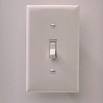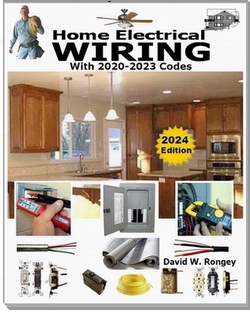Bedroom Electrical Circuit Wiring |
| All bedroom outlets, ceiling fans, lights and smoke detectors shall be on AFCI Arc-fault protected circuits. A permanently wired smoke detector is required in each bedroom and on the ceiling or wall at a point centrally located in the area giving access to bedrooms. (see more about the installation of Smoke Detectors). |
| For That Romantic Atmosphere
Add a romantic touch to your bedroom by simply installing accent lighting controlled by mood enhancing dimmer switches. |
Additional lighting fixtures, carefully placed, will assist you while you read your favorite novel just before dozing off to sleep, or become the warm touch that invites a romantic evening. Candles are a nice touch, but when it comes to new lighting features and controls you won't believe just how much control do you will have from the push of a button. Be sure to add these features into your electrical wiring diagrams. |
On the Practical Side |
Proper placement of receptacles will
eliminate the need for unsightly and unsafe extension cords as you examine
your bed wall with regard to the placement of receptacles for items
such as electric blankets, alarm clocks, and your favorite source of
music. Other considerations for your home electrical wiring for bedrooms would be nightstand lighting which
could be controlled by what are known as half-hot switched receptacles.
These receptacles conveniently allow you to control your nightstand
light from either the wall switch as you enter your bedroom or within
hands reach from your bedside. |
Don't forget the importance of telephone and wall jacks as well as cable TV provisions. |
|
Home electrical wiring for bedrooms safety requirements
The newly required AFCI (arc fault circuit interruption) devices reduce the possibility of fire and other hazards. New construction and remodel projects will require the addition of this AFCI protection. Security and AutomationImprovements in wireless control technology will help you rest easier knowing that lighting controls are at your fingertips, with a remote controlled system which can be placed on your nightstand ready for your use anytime of the day or night. |
Smart Additions for Bedroom Electrical Wiring
Improvements in ceiling fans affordably provide a variety of styles that not only cool in the summer but also warm in the winter by using easy to operate remote control units. Light and fan combination units will also provide a mood enhancing touch to your bedroom so be sure to add these options to your bedroom electrical wiring diagrams.
Additional Bedroom Electrical Wiring Options |
Lighting |
Lighting ControlsDimmer Switch Control. |
Ceiling FanGreat air flow for winter or summer. |
Smoke DetectorsInterconnected protection throughout the home. |
AFCI CircuitCircuit safety and arc protection. |






















